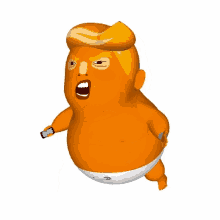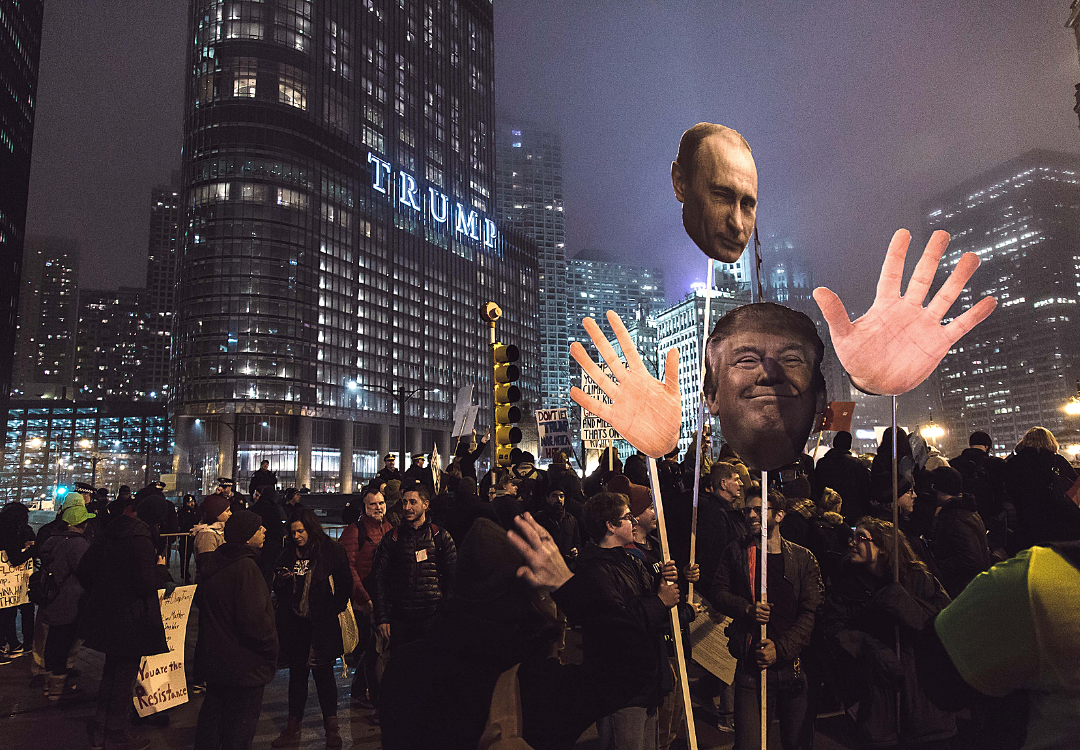The Current State of Trumpfairs
“Mr. Gorbachev…..I mean AMLO (Mexico’s newly elected president Obrador)…pay for my wall!”
Does it sometimes feel like you are in the midst of a psychedelic haze?…
Chaos! Chaos….and a thunder rambling through the head.
I was asked to do a couple of articles on trade agreements that Trump finds abhorrent; namely NAFTA and the impact of random tariffs creating economic chaos (there’s that word again) that come from some Imperial whim, rather than sound business logic. I hopped on the chance to really break down the PROS and CONS of NAFTA and offer a little insight and education on how Trump may or may not influence the agreement.
Having learned that Trump refuses to read, one wonders where his ideas come from. We know he is a genius. He has told us often enough. But just where do these ideas explode from? Oral briefings? Can’t be.
We have learned from the national security that Trump refuses to read in any depth, any length; preferring oral briefings. Honestly, when I heard that I had a split screen image of the briefers competing with cartoons for Trump’s attention.
Not to mention, what’s the count on Trump’s lies NOW? I don’t even want to guess as the average is 7.6 false or misleading claims per day, and those are just the one’s recording by fact checkers. I have to ask, why are we listening to this man?

He can’t read…
He can’t stick to his word…
He won’t stop tweeting with inane commentary…
In April 2017, he threatened to pull out of NAFTA. Canada and Mexico insisted it be renegotiated. I’m sure with the greatest reluctance, he agreed. Not quite, “You’re Fired”, but it did make for a lot of headline-grabbing.
NAFTA
A nifty idea that started under Ronald Reagan. He was thinking of a North American Common Market. Thirteen years later, President Clinton signed NAFTA. Passed by a majority of Republicans and a Republican-leaning Democratic president.
Meant to integrate and ease trade with the North American countries Canada, USA, and Mexico.
Our future president Trump called it a bad deal in 1993. A moment of consistency, yes, and his core thought on the issue was that only Mexico would benefit from the agreement.
Besides the suppressed wages and Maquiladoras standard of labor, there were the 1.3 Million Mexican farmers put out of business by NAFTA. Yes, Trump was prescient and just as offended by working folk then as now. Genius, no doubt. Did he envision a wall then too? What did those poor farmers do? Well, of course, they crossed the border. Illegally.
Low wage workers. Union threatening! What’s not to like if you are Trump? Was his stand principled? Or was it the fear of the unwashed trampling golf courses across the U.S. Example: 1995 there were 2.9 Million undocumented Mexican immigrants in the U.S. By 2000, 4.5 Million had come across the borders “sin papeles” so they could put food on the table and a roof over their family’s heads.
The North American Free Trade Agreement created the world’s largest free trade area. It links 450 million people. Its member economies generate $20.8 trillion in gross domestic product.
NAFTA is also controversial. Politicians don’t agree on whether the free trade agreement’s advantages outweigh its disadvantages. Here they are so you can decide for yourself.
What are the PROS of NAFTA? Sourced from The Balance.
[su_quote]
- NAFTA has six advantages. First, it quadrupled trade between Canada, Mexico, and the United States.
- The agreement eliminated tariffs. Trade between the three countries increased to $1.14 trillion in 2015.
- Second, greater trade increased economic output. NAFTA boosted U.S. growth by as much as 0.5 percent a year. Three industries benefited the most from increased exports. They were agriculture, automotive, and services such as healthcare and financial services.
- Third, stronger growth created jobs. U.S. exports to the other two countries led to almost 5 million new American jobs. In NAFTA’s first four years, manufacturers created 800,000 jobs.
- Fourth, foreign direct investment more than tripled. U.S. businesses invested $452 billion in Mexico and Canada. Companies in those two countries invested $240.2 billion in the United States. That helped U.S. manufacturing, insurance, and banking companies.
- Fifth, NAFTA lowered prices. U.S. oil imports from Mexico cost less because NAFTA got rid of tariffs.
- That reduces America’s reliance on oil from the Middle East. Low-cost oil reduces gas prices, which reduces transportation cost. As a result, food prices are lower
- Sixth, the agreement helped with government spending. Each nation’s government contracts became available to suppliers in all three member countries.
- That increased competition and lowered costs.
Source: Why NAFTA’s Six Advantages Outweigh Its Six Disadvantages
[/su_quote]
What are the CONS OF NAFTA?
[su_quote]
- NAFTA has six disadvantages. First, it led to the loss of 500,000-750,000 U.S. jobs. Most were in the manufacturing industries in California, New York, Michigan, and Texas. Many manufacturing companies moved to Mexico because labor was cheap. The automotive, textile, computer, and electrical appliance industries were impacted the most.
- Second, job migration suppressed wages. Companies threatened to move to Mexico to keep workers from joining unions. Without the unions, workers could not bargain for better wages. This strategy was so successful that it became standard operating procedure. Between 1993 and 1995, half of all companies used it. By 1999, that rate had grown to 65 percent.
- Third, NAFTA put Mexican farmers out of business. It allowed U.S. government-subsidized farm products into Mexico. Local farmers could not compete with the subsidized prices. As a result, 1.3 million farmers were put out of business, according to the Economic Policy Institute. It forced unemployed farmers to cross the border illegally to find work. In 1995, there were 2.9 million Mexicans living in the United States illegally. It increased to 4.5 million in 2000, probably due to NAFTA.
- The recession drove that figure to 6.9 million in 2007. In 2014, it fell to 5.8 million, roughly double where it was before NAFTA.
- Fourth, unemployed Mexican farmers went to work in substandard conditions in the maquiladora program. Maquiladora is where United States-owned companies employ Mexican workers near the border. They cheaply assemble products for export back into the United States. The program grew to employ 30 percent of Mexico’s labor force.
- Fifth, U.S. companies degraded the Mexican environment to keep costs low. Agribusiness in Mexico used more fertilizers and other chemicals. The result was $36 billion more per year in pollution. Rural farmers were forced into marginal land to stay in business. They cut down 630,000 hectares of forests per year. That deforestation contributes to global warming.
- Sixth, NAFTA allowed Mexican trucks access into the United States. Mexican trucks are not held to the same safety standards as American trucks. Congress never allowed this provision to go into effect.
Source: Why NAFTA’s Six Advantages Outweigh Its Six Disadvantages
[/su_quote]
NAFTA’s Pros Outweigh Its Cons
[su_quote]
NAFTA’s disadvantages are significant. Can anything justify the loss of entire industries in New York or Michigan? Worker mistreatment in the United States or in the maquiladora program is significant. NAFTA may also be responsible for environmental damage along the border.
But from an economic perspective, NAFTA is a success. Without it, the United States would not be as strong a competitor with the European Union or China. That’s critical now that both of these trade areas rank above the United States as the world’s largest economies.
The increased trade was sorely needed after the 2008 financial crisis. Even more people would be unemployed without NAFTA.
Perhaps NAFTA should have been designed with better protections. At the same time, free trade agreements are a necessity for the United States when competing in an ever more globalized world.
[/su_quote]
Let me share with you the start of an article by Nomi Prins. I’d recommend having a look at her website.
Donald Trump’s Trade Wars Could Lead to the Next Great Depression
EDITOR’S NOTE: This article originally appeared at TomDispatch.com.
[su_quote]
Readers are routinely confronted with philosophical dilemmas. Here’s a classic one for our Trumptopian times: If you make enemies out of your friends and friends out of your enemies, where does that leave you?
What does winning (or losing) really look like? Is a world in which walls of every sort encircle America’s borders a goal worth seeking? And what would be left in a future fragmented international economic system marked by tit-for-tat tariffs, travel restrictions, and hyper-nationalism? Ultimately, how will such a world affect regular people?
Let’s cut through all of this for the moment and ask one crucial question about our present cult-of-personality era in American politics: Other than accumulating more wealth and influence for himself, his children, and the Trump family empire, what’s Donald J. Trump’s endgame as president? If his goal is to keep this country from being, as he likes to complain, “the world’s piggy bank,” then his words, threats, and actions are concerning. However bombastic and disdainful of a history he appears to know little about, he is already making the world a less stable, less affordable, and more fear-driven place. In the end, it’s even possible that, despite the upbeat economic news of the moment, he could almost single-handedly smash that piggy bank himself, as he has many of his own business ventures.
[/su_quote]
The Breakdown & Trump’s Effect on NAFTA
It is my understanding that the Trump Administration will hold off renegotiating NAFTA. This is a good thing. NAFTA is a child of a neo-liberal fantasy that has kept our economy trailing behind standards that were kept from 1950 thru the early 70’s. The working people and poor that keep our economy functioning and growing have lost so much in these last 30+ years since Reagan and his troops sold us their bill of goods.
Does anyone believe that Trump, Wilbur Ross, or anyone else in this bizarre administration look like they will give us a better deal? Without participating in the act of reading anything in detail and the constant pastime of running his mouth, Trump has walked us into a possible trade war with our closest neighbors.
Doug Anderson is a member of the A.R. Marketing House research and writing team. His focuses span domestic and international politics, environmental sustainability, and holistic health.


